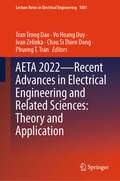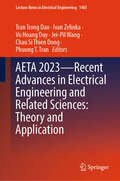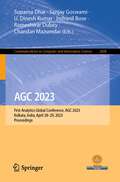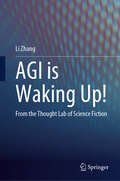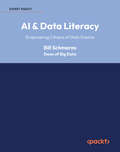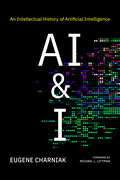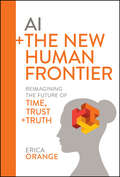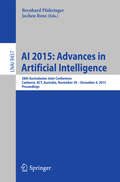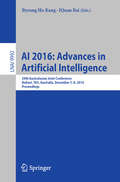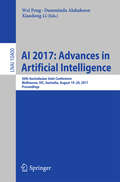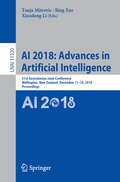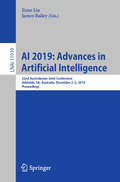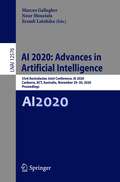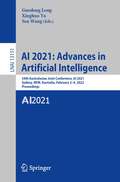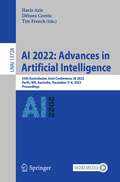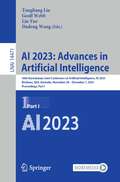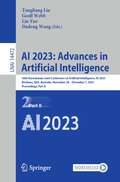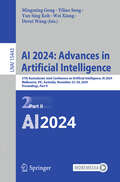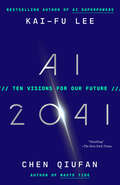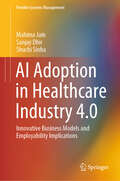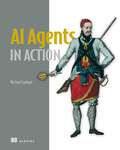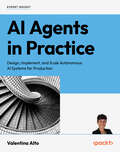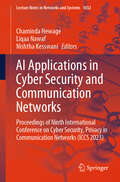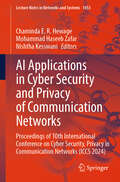- Table View
- List View
AETA 2022—Recent Advances in Electrical Engineering and Related Sciences: Theory And Application (Lecture Notes in Electrical Engineering #1081)
by Ivan Zelinka Vo Hoang Duy Tran Trong Dao Chau Si Thien Dong Phuong T. TranThis proceedings book features selected papers on 12 themes, including wireless communications, power systems, signal processing, robotics, control systems, sustainable energy, power electronics, intelligent networks and more. Covering topics such as performance of reconfigurable intelligent surfaces for 6G communication networks, improved neural network algorithms for optimizing the power flow of renewable energy sources, anomaly detection using stationary and non-stationary signal analysis in data sciences, novel object identification and distance estimation algorithms for self-driving vehicles, the book presents interesting ideas and state-of-the-art overviews.
AETA 2023—Recent Advances in Electrical Engineering and Related Sciences: Theory and Application (Lecture Notes in Electrical Engineering #1405)
by Ivan Zelinka Vo Hoang Duy Tran Trong Dao Chau Si Thien Dong Phuong T. Tran Jei-Pil WangThis book features selected papers from the 8th International Conference in Advanced Engineering—Theory Applications (AETA 2023), during 14–16 December, in Busan, Korea. The topics of the papers cover three main topics: energy (energy saving power electronics, electrical machines and drive systems, green-energy IT, nontrivial dynamics of electronic devices); control engineering (robotics, automatic control, biosensor IT); communication and security (broadcasting IT, communications, cyber security). Its content caters to researchers, scientist, and engineers who are interested in scientific achievements and advanced technologies of electrical, electronic-telecommunication, computer science, and mechanical-mechatronics engineering.
AGC 2023: First Analytics Global Conference, AGC 2023, Kolkata, India, April 28–29, 2023, Proceedings (Communications in Computer and Information Science #2008)
by Chandan Mazumdar Suparna Dhar Sanjay Goswami U. Dinesh Kumar Indranil Bose Rameshwar DubeyThis book constitutes the refereed proceedings of the 1st Analytics Global Conference, AGC 2023, held in Kolkata, India, in April 2023. The AGC conference sought to facilitate industry-academia interfacing in the domain of machine learning and artificial intelligence.The 11 full papers presented in these proceedings were carefully reviewed and selected from 36 submissions. The papers are organized in the two topical sections: Applications of Analytics in Business and Machine Learning & Deep Learning and Text Analytics.
AGI is Waking Up!: From the Thought Lab of Science Fiction
by Li ZhangThis book is an engaging and comprehensive exploration that delves into the possibility of artificial intelligence developing self-awareness, the conditions under which it may occur, and the potential behaviours it may exhibit once self-aware. It adopts a &‘high-dimensional philosophy&’, coined by the author, as its theoretical framework and weaves together elements from science fiction films, scholarly works, and thought experiments. Introducing the captivating concept of "Sparkling Moments," the book provides a compelling analysis of the reasons, prerequisites, and manifestations of these pivotal moments. It further scrutinizes the evolutionary history of Earth's life forms through the lens of these transformative instances and analyzes the similarities and differences between carbon-based and silicon-based life. This book suggests that it is possible for artificial intelligence to develop self-consciousness, which will emerge during a significant sparkling moment. Spanning across disciplines such as astronomy, physics, chemistry, biology, neuroscience, psychology, sociology, this book employs a unified and accessible high-dimensional philosophical discourse to bridge the realms of natural sciences and social humanities. Its captivating presentation, enriched with visual aids and lucid explanations, enables readers to grasp the overarching panorama of cosmic evolution, biological adaptation, and the trajectory of artificial intelligence development. Furthermore, the book offers insightful predictions for the future and endeavours to discover novel approaches to foster harmonious interactions between humans and machines. The translation was done with the help of artificial intelligence. A subsequent human revision was done primarily in terms of content.
AI & Data Literacy: Empowering Citizens of Data Science
by Bill SchmarzoLearn the key skills and capabilities that empower Citizens of Data Science to not only survive but thrive in an AI-dominated world. Purchase of the print or Kindle book includes a free PDF eBookKey FeaturesPrepare for a future dominated by AI and big dataEnhance your AI and data literacy with real-world examplesLearn how to leverage AI and data to address current and future challengesBook DescriptionAI is undoubtedly a game-changing tool with immense potential to improve human life. This book aims to empower you as a Citizen of Data Science, covering the privacy, ethics, and theoretical concepts you’ll need to exploit to thrive amid the current and future developments in the AI landscape. We'll explore AI's inner workings, user intent, and the critical role of the AI utility function while also briefly touching on statistics and prediction to build decision models that leverage AI and data for highly informed, more accurate, and less risky decisions. Additionally, we'll discuss how organizations of all sizes can leverage AI and data to engineer or create value. We'll establish why economies of learning are more powerful than the economies of scale in a digital-centric world. Ethics and personal/organizational empowerment in the context of AI will also be addressed. Lastly, we'll delve into ChatGPT and the role of Large Language Models (LLMs), preparing you for the growing importance of Generative AI. By the end of the book, you'll have a deeper understanding of AI and how best to leverage it and thrive alongside it.What you will learnGet to know the fundamentals of data literacy, privacy, and analyticsFind out what makes AI tick and the role of the AI utility functionMake informed decisions using prominent decision-making frameworksUnderstand relevant statistics and probability conceptsCreate new sources of value by leveraging and applying AI and dataApply ethical parameters to AI development with real-world examplesFind out how to get the most out of ChatGPT and its peersWho this book is forThis book is designed to benefit everyone from students to established business leaders and professionals who want to learn how to leverage data and analytics to accelerate their AI and Data literacy.
AI & I: An Intellectual History of Artificial Intelligence
by Eugene CharniakA concise and illuminating history of the field of artificial intelligence from one of its earliest and most respected pioneers.AI & I is an intellectual history of the field of artificial intelligence from the perspective of one of its first practitioners, Eugene Charniak. Charniak entered the field in 1967, roughly 12 years after AI&’s founding, and was involved in many of AI&’s formative milestones. In this book, he traces the trajectory of breakthroughs and disappointments of the discipline up to the current day, clearly and engagingly demystifying this oft revered and misunderstood technology. His argument is controversial but well supported: that classical AI has been almost uniformly unsuccessful and that the modern deep learning approach should be viewed as the foundation for all the exciting developments that are to come.Written for the scientifically educated layperson, this book chronicles the history of the field of AI, starting with its origin in 1956, as a topic for a small academic workshop held at Dartmouth University. From there, the author covers reasoning and knowledge representation, reasoning under uncertainty, chess, computer vision, speech recognition, language acquisition, deep learning, and learning writ large. Ultimately, Charniak takes issue with the controversy of AI—the fear that its invention means the end of jobs, creativity, and potentially even humans as a species—and explains why such concerns are unfounded. Instead, he believes that we should embrace the technology and all its potential to benefit society.
AI + The New Human Frontier: Reimagining the Future of Time, Trust + Truth
by Erica OrangeA critical discussion of AI as a transformative opportunity for humanity AI + The New Human Frontier: Reimagining the Future of Time, Trust + Truth by Erica Orange, a renowned futurist, offers a compelling exploration of generative AI's potential to enhance human creativity rather than replace it. This pivotal book navigates how AI tools will help shape the human experience, and aid in augmenting human ingenuity and imagination. The author eloquently argues that the essence of human intelligence—our curiosity, critical thinking, empathy, and more—is not only irreplaceable but will become increasingly valuable as AI evolves to take on routine tasks. AI + the New Human Frontier is a clarion call for embedding trust, human oversight and judgement into AI development, ensuring that the technology amplifies our most human capabilities. At a time when the lines between what is real, fake, true and false are becoming more blurred, reliance on human-centric solutions, not just technological ones, will become more critical. Why AI + The New Human Frontier is a must-read: Navigate the Future with Confidence: Prepare yourself for the future with groundbreaking perspectives on the relationship between humans and AI. Find out how to futureproof against the challenges of tomorrow and seize the opportunities presented by technological advancements. Understand how to capitalize on the Potential of AI: Learn how the next generation of AI tools can expand human creativity and intelligence, not diminish it. Discover the crucial role of human oversight in creating AI technologies that enhance our capabilities and work alongside us. Amplify Your Ability to leverage the human advantage: Understand why and how AI's advancement will make human intuition, empathy, and critical thinking more essential than ever. Get insights into how to leverage your most human-centric skills in an AI-driven world. Perfect for business leaders, managers, executives, and professionals navigating the new landscape of technology, AI + The New Human Frontier provides not only a vision of the future but also practical advice on thriving in an AI-enhanced world. Add this book to your library to ensure you're ready for the transformative changes that lie ahead.
AI 2015: 28th Australasian Joint Conference, Canberra, ACT, Australia, November 30 -- December 4, 2015, Proceedings (Lecture Notes in Computer Science #9457)
by Bernhard Pfahringer Jochen RenzThis book constitutes the refereed proceedings of the 28th Australasian Joint Conference on Artificial Intelligence, AI 2015, held in Canberra, Australia, in November/December 2015. The 39 full papers and 18 short papers presented were carefully reviewed and selected from 102 submissions.
AI 2016: 29th Australasian Joint Conference, Hobart, TAS, Australia, December 5-8, 2016, Proceedings (Lecture Notes in Computer Science #9992)
by Quan Bai Byeong Ho KangThis book constitutes the refereed proceedings of the 29th Australasian Joint Conference on Artificial Intelligence, AI 2016, held in Hobart, TAS, Australia, in December 2016. The 40 full papers and 18 short papers presented together with 8 invited short papers were carefully reviewed and selected from 121 submissions. The papers are organized in topical sections on agents and multiagent systems; AI applications and innovations; big data; constraint satisfaction, search and optimisation; knowledge representation and reasoning; machine learning and data mining; social intelligence; and text mining and NLP. The proceedings also contains 2 contributions of the AI 2016 doctoral consortium and 6 contributions of the SMA 2016.
AI 2017: 30th Australasian Joint Conference, Melbourne, VIC, Australia, August 19–20, 2017, Proceedings (Lecture Notes in Computer Science #10400)
by Xiaodong Li Wei Peng Damminda AlahakoonThis book constitutes the refereed proceedings of the 30th Australasian Joint Conference on Artificial Intelligence, AI 2017, held in Melbourne, VIC, Australia, in August 2017. The 29 full papers were carefully reviewed and selected from 58 submissions. This volume covers a wide spectrum of research streams in artificial intelligence ranging from machine learning, optimization to big data science and their practical applications.
AI 2018: 31st Australasian Joint Conference, Wellington, New Zealand, December 11-14, 2018, Proceedings (Lecture Notes in Computer Science #11320)
by Xiaodong Li Tanja Mitrovic Bing XueThis book constitutes the proceedings of the 31st Australasian Joint Conference on Artificial Intelligence, AI 2018, held in Wellington, New Zealand, in December 2018. The 50 full and 26 short papers presented in this volume were carefully reviewed and selected from 125 submissions. The paper were organized in topical sections named: agents, games and robotics; AI applications and innovations; computer vision; constraints and search; evolutionary computation; knowledge representation and reasoning; machine learning and data mining; planning and scheduling; and text mining and NLP.
AI 2019: 32nd Australasian Joint Conference, Adelaide, SA, Australia, December 2–5, 2019, Proceedings (Lecture Notes in Computer Science #11919)
by James Bailey Jixue LiuThis book constitutes the proceedings of the 32nd Australasian Joint Conference on Artificial Intelligence, AI 2019, held in Adelaide, SA, Australia, in December 2019. The 48 full papers presented in this volume were carefully reviewed and selected from 115 submissions. The paper were organized in topical sections named: game and multiagent systems; knowledge acquisition, representation, reasoning; machine learning and applications; natural language processing and text analytics; optimization and evolutionary computing; and image processing.
AI 2020: 33rd Australasian Joint Conference, AI 2020, Canberra, ACT, Australia, November 29–30, 2020, Proceedings (Lecture Notes in Computer Science #12576)
by Marcus Gallagher Nour Moustafa Erandi LakshikaThis book constitutes the proceedings of the 33rd Australasian Joint Conference on Artificial Intelligence, AI 2020, held in Canberra, ACT, Australia, in November 2020.*The 36 full papers presented in this volume were carefully reviewed and selected from 57 submissions. The paper were organized in topical sections named: applications; evolutionary computation; fairness and ethics; games and swarms; and machine learning. *The conference was held virtually due to the COVID-19 pandemic.
AI 2021: 34th Australasian Joint Conference, AI 2021, Sydney, NSW, Australia, February 2–4, 2022, Proceedings (Lecture Notes in Computer Science #13151)
by Xinghuo Yu Sen Wang Guodong LongThis book constitutes the proceedings of the 34th Australasian Joint Conference on Artificial Intelligence, AI 2021, held in Sydney, NSW, Australia, in February 2022.* The 64 full papers presented in this volume were carefully reviewed and selected from 120 submissions. The papers were organized in topical sections named: Ethical AI, Applications, Classical AI, Computer Vision and Machine Learning, Natural Language Processing and Data Mining, and Network Analysis. *The conference was postponed from December 2021 to February 2022 and held virtually due to the COVID-19 pandemic.
AI 2022: 35th Australasian Joint Conference, AI 2022, Perth, WA, Australia, December 5–8, 2022, Proceedings (Lecture Notes in Computer Science #13728)
by Tim French Haris Aziz Débora CorrêaThis book constitutes the refereed proceedings of the 35th Australasian Joint Conference on Artificial Intelligence, AI 2022, which took place in Perth, WA, Australia, in December 5–8, 2022. The 56 full papers included in this book were carefully reviewed and selected from 90 submissions. They were organized in topical sections as follows: Computer Vision; Deep Learning; Ethical/Explainable AI; Genetic Algorithms; Knowledge Representation and NLP; Machine Learning; Medical AI; Optimization; and Reinforcement Learning.
AI 2023: 36th Australasian Joint Conference on Artificial Intelligence, AI 2023, Brisbane, QLD, Australia, November 28–December 1, 2023, Proceedings, Part I (Lecture Notes in Computer Science #14471)
by Dadong Wang Geoff Webb Lin Yue Tongliang LiuThis two-volume set LNAI 14471-14472 constitutes the refereed proceedings of the 36th Australasian Joint Conference on Artificial Intelligence, AI 2023, held in Brisbane, QLD, Australia during November 28 – December 1, 2023. The 23 full papers presented together with 59 short papers were carefully reviewed and selected from 213 submissions. They are organized in the following topics: computer vision; deep learning; machine learning and data mining; optimization; medical AI; knowledge representation and NLP; explainable AI; reinforcement learning; and genetic algorithm.
AI 2023: 36th Australasian Joint Conference on Artificial Intelligence, AI 2023, Brisbane, QLD, Australia, November 28–December 1, 2023, Proceedings, Part II (Lecture Notes in Computer Science #14472)
by Dadong Wang Geoff Webb Lin Yue Tongliang LiuThis two-volume set LNAI 14471-14472 constitutes the refereed proceedings of the 36th Australasian Joint Conference on Artificial Intelligence, AI 2023, held in Brisbane, QLD, Australia during November 28 – December 1, 2023. The 23 full papers presented together with 59 short papers were carefully reviewed and selected from 213 submissions. They are organized in the following topics: computer vision; deep learning; machine learning and data mining; optimization; medical AI; knowledge representation and NLP; explainable AI; reinforcement learning; and genetic algorithm..
AI 2024: 37th Australasian Joint Conference on Artificial Intelligence, AI 2024, Melbourne, VIC, Australia, November 25–29, 2024, Proceedings, Part I (Lecture Notes in Computer Science #15442)
by Wei Xiang Yun Sing Koh Mingming Gong Yiliao Song Derui WangThis two-volume set LNAI 15442-15443 constitutes the refereed proceedings of the 37th Australasian Joint Conference on Artificial Intelligence, AI 2024, held in Melbourne, VIC, Australia, during November 25-29, 2024. The 59 full papers presented together with 3 short papers were carefully reviewed and selected from 108 submissions. Part 1: Knowledge Representation and NLP; Trustworthy and Explainable AI; Machine Learning and Data Mining. Part 2: Reinforcement Learning and Robotics; Learning Algorithms; Computer Vision; AI for Healthcare.
AI 2024: 37th Australasian Joint Conference on Artificial Intelligence, AI 2024, Melbourne, VIC, Australia, November 25–29, 2024, Proceedings, Part II (Lecture Notes in Computer Science #15443)
by Wei Xiang Yun Sing Koh Mingming Gong Yiliao Song Derui WangThis two-volume set LNAI 15442-15443 constitutes the refereed proceedings of the 37th Australasian Joint Conference on Artificial Intelligence, AI 2024, held in Melbourne, VIC, Australia, during November 25-29, 2024. The 59 full papers presented together with 3 short papers were carefully reviewed and selected from 108 submissions. Part 1: Knowledge Representation and NLP; Trustworthy and Explainable AI; Machine Learning and Data Mining. Part 2: Reinforcement Learning and Robotics; Learning Algorithms; Computer Vision; AI for Healthcare.
AI 2041: Ten Visions for Our Future
by Kai-Fu Lee Chen QiufanHow will AI change our world within twenty years? A pioneering technologist and acclaimed writer team up for a &“dazzling&” (The New York Times) look at the future that &“brims with intriguing insights&” (Financial Times). This edition includes a new foreword by Kai-Fu Lee. A BEST BOOK OF THE YEAR: The Wall Street Journal, The Washington Post, Financial Times Long before the advent of ChatGPT, Kai-Fu Lee and Chen Qiufan understood the enormous potential of artificial intelligence to transform our daily lives. But even as the world wakes up to the power of AI, many of us still fail to grasp the big picture. Chatbots and large language models are only the beginning. In this &“inspired collaboration&” (The Wall Street Journal), Lee and Chen join forces to imagine our world in 2041 and how it will be shaped by AI. In ten gripping, globe-spanning short stories and accompanying commentary, their book introduces readers to an array of eye-opening settings and characters grappling with the new abundance and potential harms of AI technologies like deep learning, mixed reality, robotics, artificial general intelligence, and autonomous weapons.
AI Adoption in Healthcare Industry 4.0: Innovative Business Models and Employability Implications (Flexible Systems Management)
by Sanjay Dhir Shuchi Sinha Mahima JainThis book focuses on the prominent innovative business models and employability implications of artificial intelligence in the healthcare industry 4.0. To do so, it draws upon a rich base of case studies from robotics, virtual assistants, precision medicine, etc., to highlight the possibilities and implications of AI on health care. The book is useful in a variety of ways to the different stakeholders of healthcare sector. It helps medical professionals to understand the impact of the present technologies being adopted and the potential of AI-based technology. The content is of use for the policy makers as it also highlights the managerial and research implications, challenges, opportunities posed by the adoption of AI in healthcare industry 4.0. The rich case study analysis in the area of adoption of AI in healthcare helps generate insights for the academicians and researchers of this field in terms of the parallels drawn between adoptions of AI in healthcare industry 4.0 across the world. It is also useful for management students to understand the key management perspective when healthcare organizations attempt to devise strategies/policies for adoption of AI-driven technologies and processes implementation.
AI Agents in Action (In Action)
by Micheal LanhamCreate LLM-powered autonomous agents and intelligent assistants tailored to your business and personal needs.From script-free customer service chatbots to fully independent agents operating seamlessly in the background, AI-powered assistants represent a breakthrough in machine intelligence. In AI Agents in Action, you'll master a proven framework for developing practical agents that handle real-world business and personal tasks. Author Micheal Lanham combines cutting-edge academic research with hands-on experience to help you: • Understand and implement AI agent behavior patterns • Design and deploy production-ready intelligent agents • Leverage the OpenAI Assistants API and complementary tools • Implement robust knowledge management and memory systems • Create self-improving agents with feedback loops • Orchestrate collaborative multi-agent systems • Enhance agents with speech and vision capabilities You won't find toy examples or fragile assistants that require constant supervision. AI Agents in Action teaches you to build trustworthy AI capable of handling high-stakes negotiations. You'll master prompt engineering to create agents with distinct personas and profiles, and develop multi-agent collaborations that thrive in unpredictable environments. Beyond just learning a new technology, you'll discover a transformative approach to problem-solving. About the technology Most production AI systems require many orchestrated interactions between the user, AI models, and a wide variety of data sources. AI agents capture and organize these interactions into autonomous components that can process information, make decisions, and learn from interactions behind the scenes. This book will show you how to create AI agents and connect them together into powerful multi-agent systems. About the book In AI Agents in Action, you&’ll learn how to build production-ready assistants, multi-agent systems, and behavioral agents. You&’ll master the essential parts of an agent, including retrieval-augmented knowledge and memory, while you create multi-agent applications that can use software tools, plan tasks autonomously, and learn from experience. As you explore the many interesting examples, you&’ll work with state-of-the-art tools like OpenAI Assistants API, GPT Nexus, LangChain, Prompt Flow, AutoGen, and CrewAI. What's inside • Knowledge management and memory systems • Feedback loops for continuous agent learning • Collaborative multi-agent systems • Speech and computer vision About the reader For intermediate Python programmers. About the author Micheal Lanham is a software and technology innovator with over 20 years of industry experience. He has authored books on deep learning, including Manning&’s Evolutionary Deep Learning. Table of Contents 1 Introduction to agents and their world 2 Harnessing the power of large language models 3 Engaging GPT assistants 4 Exploring multi-agent systems 5 Empowering agents with actions 6 Building autonomous assistants 7 Assembling and using an agent platform 8 Understanding agent memory and knowledge 9 Mastering agent prompts with prompt flow 10 Agent reasoning and evaluation 11 Agent planning and feedback A Accessing OpenAI large language models B Python development environment
AI Agents in Practice: Design, implement, and scale autonomous AI systems for production
by Valentina AltoMaster the art of building AI agents with this hands-on guide to orchestration, multi-agent systems, real-world case studies, and ethical insights to drive immediate business impactKey FeaturesBuild production-ready AI agents with hands-on tutorials for diverse industry applicationsExplore multi-agent system architectures with practical frameworks for orchestrator comparisonFuture-proof your AI development with ethical implementation strategies and security patternsPurchase of the print or Kindle book includes a free PDF eBookBook DescriptionAs AI agents evolve to take on complex tasks and operate autonomously, you need to learn how to build these next-generation systems. Author Valentina Alto brings practical, industry-grounded expertise in AI Agents in Practice to help you go beyond simple chatbots and create AI agents that plan, reason, collaborate, and solve real-world problems using large language models (LLMs) and the latest open-source frameworks. In this book, you'll get a comparative tour of leading AI agent frameworks such as LangChain and LangGraph, covering each tool's strengths, ideal use cases, and how to apply them in real-world projects. Through step-by-step examples, you’ll learn how to construct single-agent and multi-agent architectures using proven design patterns to orchestrate AI agents working together. Case studies across industries will show you how AI agents drive value in real-world scenarios, while guidance on responsible AI will help you implement ethical guardrails from day one. The chapters also set the stage with a brief history of AI agents, from early rule-based systems to today's LLM-driven autonomous agents, so you understand how we got here and where the field is headed. By the end of this book, you'll have the practical skills, design insights, and ethical foresight to build and deploy AI agents that truly make an impact.What you will learnBuild core agent components such as LLMs, memory systems, tool integration, and context managementDevelop production-ready AI agents using frameworks such as LangChain with codeCreate effective multi-agent systems using orchestration patterns for problem-solvingImplement industry-specific agents for e-commerce, customer support, and moreDesign robust memory architectures for agents with short- and long-term recallApply responsible AI practices with monitoring, guardrails, and human oversightOptimize AI agent performance and cost for production environmentsWho this book is forThis book is ideal for AI engineers and data scientists looking to move beyond basic LLM implementations to build sophisticated autonomous agents. Software developers and system architects will find practical guidelines for integrating agents into existing tech stacks. Product managers and technical entrepreneurs will gain strategic insights into how AI agents can solve business problems across industries. A basic understanding of machine learning concepts and working knowledge of Python are required to make the most of this book and implement production-ready AI agent systems.
AI Applications in Cyber Security and Communication Networks: Proceedings of Ninth International Conference on Cyber Security, Privacy in Communication Networks (ICCS 2023) (Lecture Notes in Networks and Systems #1032)
by Nishtha Kesswani Chaminda Hewage Liqaa NawafThis book is a collection of high-quality peer-reviewed research papers presented at the Ninth International Conference on Cyber-Security, Privacy in Communication Networks (ICCS 2023) held at Cardiff School of Technologies, Cardiff Metropolitan University, Cardiff, UK, during 11–12 December 2023. This book presents recent innovations in the field of cyber-security and privacy in communication networks in addition to cutting edge research in the field of next-generation communication networks.
AI Applications in Cyber Security and Privacy of Communication Networks: Proceedings of 10th International Conference on Cyber Security, Privacy in Communication Networks (ICCS 2024) (Lecture Notes in Networks and Systems #1453)
by Nishtha Kesswani Chaminda E.R. Hewage Mohammad Haseeb ZafarThe book is a collection of high-quality peer-reviewed research papers presented in the Tenth International Conference on Cyber Security, Privacy in Communication Networks (ICCS 2024) held at Cardiff Metropolitan University, Cardiff, United Kingdom during 9 – 10 December 2024. This book presents recent innovations in the field of cyber security and privacy in communication networks in addition to cutting edge research in the field of next generation communication networks.
